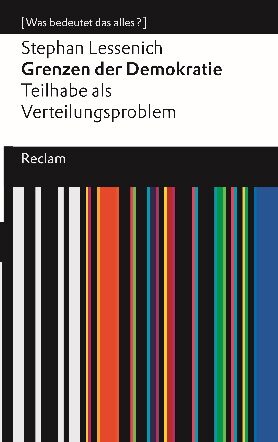Stephan Lessenich
Grenzen der Demokratie. Teilhabe als Verteilungsproblem
[The Limits of Democracy. Participation as a problem of distribution]
- Reclam Verlag
- Ditzingen 2019
- ISBN 978-3-15-011237-3
- 141 Pages
- Publisher’s contact details
Published in Greek with a grant from Litrix.de.
Sample translations
For a New Culture of Solidarity
This narrative is driven forward by two dynamics: a narrative of democratic progress on the one hand, and the assertion of democratic decadence on the other. Both can be found among Colin Crouch’s today famous theses on the status of Western democracy. Against the backdrop of increasingly surging effects of globalisation and digitalisation, his book, Post-Democracy, published in 2004, certainly struck a chord. Under the auspices of the neocons, according to Crouch, the ‘golden age’ of democracy is a thing of the past. Stephan Lessenich now traces the parabola of decline to carve out the dialectics of democracy itself. The notion that there actually ever was such a ‘golden age’ must, in his view, necessarily blank out the fact that democratisation has always been a struggle for entitlement and participation.
At first it was the bourgeoisie which, emboldened by its economic indispensability for the nation, aspired to political participation. Subsequently, workers also demanded their voice to be heard. Just as an aside: a universal holiday entitlement—granting workers a ‘citizen status’—was not codified in West German law until 1963. After the women’s movement had fought for the women’s vote, various minorities struggled for inclusion on the democratic playing field. If we conceive of democracy as a process of expanding spaces of entitlement, democracy can be best grasped as a grand inclusion machine. However, this expansion has always occurred in the spirit of competition. For a long time, the great civic levelling represented a profitable deal between capital and labour. As it were, it was the western industrial nations’ mainstream culture: ‘It is only logical, then, that citizens in the competitive society, once they have brought themselves to safety, intone the all too familiar slogan of the privileged: “The boat is full!”’
Against this backdrop, Stephan Lessenich calls for a radical expansion of civil and electoral rights. He regards the slogan of the ‘full boat’ not as a crisis symptom, but rather as a programming error of democracy itself. When more and more people start fearing for their own privileges, there remains little leeway for generosity in terms of tolerance for the participation of others. The ‘limits of democracy’ become increasingly narrower when immigrants or refugees aspire to become part of the local democratic community. Viktor Orbán’s announcement in the summer of 2016 to have sealed off Hungary’s border with Serbia ‘hermetically’ is the embodiment of this ‘practice of reaction’.
What is manifest today is thus the performative self-contradiction of modern democracies. Guaranteeing their own survival through the exclusion of others does not correspond to their self-image. Nor would liberal circles admit that freedom is threatening to increasingly become a status symbol of a few who are entitled to access. Whatever is outside right now, should remain outside. In this logic, nature necessarily becomes the Other which lies outside of democratic bounds and can therefore, just like cheap labour forces in non-democratic countries, be harnessed as a resource for western democracy. In this context, Lessenich sees structural violence at work, something righteous democrats in this part of the world prefer not to know about. In short: democracy increasingly comes at a price paid by those who cannot afford democracy.
Half a century ago, American science historian Lynn White asked with regard to the ecological crisis whether a democratic culture would be able to survive its own consequences. Similarly, Lessenich believes that this survival can only be achieved if democracy reinvents itself. Incidentally, the welfare-state compromise has been abandoned by the capital side as it is. Globalisation and liberalisation, Lessenich argues, have liberated the owners of capital from the ‘social shackles’ almost silently. The consequences include experiences of degradation among the middle classes and constitute a gateway for right-wing rabble-rousers!
At the same time, an awareness of the problems and the readiness for protest are rising throughout society. Lessenich wants to make use of this momentum: solidarity, however, must be retrieved from the corner of harmless terms and turned into a political battle cry. The implication is a relinquishment of privilege, allowing for the preservation of nature just as much as for a functioning community. ‘The very first real utopia of an altered democratic border regime would therefore have to be the guarantee of the political electoral right for all those who populate the political community—regardless of whether they have “always lived here”, whether they are migrants with non-German citizenship of the first, second or whatever generation or whether they were rescued from the Mediterranean and taken to—at that point in the true sense of the word—a safe haven only yesterday.’ At this point, this remarkable short piece turns from being a social-scientific survey into a left-wing polemic pursuing no less than the salvation of democracy—before others gleefully become its gravediggers.
Translated by Jan-Peter Herrmann

By Katharina Teutsch
Katharina Teutsch is a journalist and critic. She writes for newspapers and magazines such as: the Frankfurter Allgemeine Zeitung, Tagesspiegel, die Zeit, PhilosophieMagazin and for Deutschlandradio Kultur.
Publisher's Summary
Every democratic process evokes political and social countermovements. This can be seen in the shift to the right Europe is experiencing at the moment. A militant democracy needs to be able to re-act to such threats dynamically without infringing the rights of individuals. Stephan Lessenich out-lines perspectives for a progressive, socially inclusive and sustainable democracy.
(Text: Reclam Verlag)
